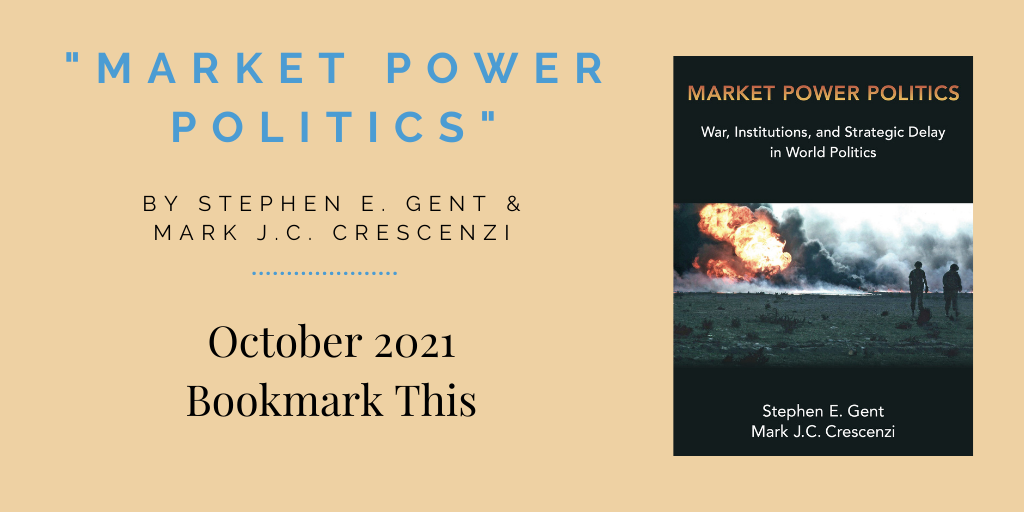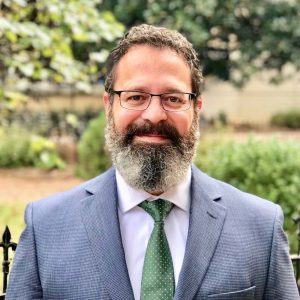 Bookmark This is a feature that highlights new books by College of Arts & Sciences faculty and alumni, published the first week of each month.
Bookmark This is a feature that highlights new books by College of Arts & Sciences faculty and alumni, published the first week of each month.
Featured book: Market Power Politics: War, Institutions and Strategic Delay in World Politics (Oxford University Press, February 2021) by Stephen E. Gent and Mark J.C. Crescenzi.

Q: Can you give us a brief synopsis of your book?
A: How are the Iraqi invasion of Kuwait, the Russian incursions into Ukraine and Georgia, and China’s occupation of islands in the South China Sea related? All three of these important moments in modern history were driven by the motivation to capture market power. Whether it was oil for Iraq, natural gas for Russia, or rare earth elements for China, the goal isn’t just the commodities themselves — it is the ability to determine their price on the global market. In Market Power Politics, we develop a new theory of market power politics that explains when and why countries will delay cooperation or even fight wars in pursuit of this elusive goal.
Q: How does this fit in with your research interests and passions?
A: We are both peace science scholars and combined we have almost 40 years of experience in studying the causes of war. It can be a difficult topic for many reasons, so you really need to have a passion for uncovering the things that make conflict and war more likely. The ultimate goal is to give the world the tools it needs to avoid conflict, and it can be frustrating to see the same mistakes playing out over and over. In this book, we were able to write about how some very successful global institutions (like the United Nations Convention on the Law of the Sea) weren’t designed to solve this particular problem of market power opportunities. The book points us in a new direction for developing foreign policies and international institutions that can overcome the temptation to fight.
Q: What was the original idea that made you think: “There’s a book here?”
A: This book was born on the balcony of the UNC Student Stores, sitting on a bench with a cup of coffee. We have worked together before, but in this case we were meeting to help one another with individual research projects that were stuck. Stephen was studying international institutions in world politics and why they were more (or less) effective at coordinating states in some circumstances. Mark was studying the flip side of earlier research on economic interdependence and conflict and was trying to understand the role of market structures in driving states toward conflict. As we advised one another about ways to solve the problems that had us flummoxed, we realized that we were each holding the missing piece to each other’s puzzle.

Q: What surprised you when researching/writing this book?
A: We had to dive deep into specific markets to understand when and how they were linked to international conflict. Stephen took on the challenge of learning everything about natural gas and Russia’s role in the European energy market. Mark took on the job of learning about the rare earth elements market and China’s dominance of rare earth mining. Both tasks were well outside our comfort zones as scholars who are more accustomed to using large data sets and statistics. We were both surprised at how much fun it was to learn about these things, especially as we got over the huge imposter complex of not being experts.
Q: Where’s your go-to writing spot, and how do you deal with writer’s block?
A: Stephen: I find that I write best when I can mix up my writing spaces, so I like to split my time between writing in my home office and in local coffee shops. Though finishing this book during the pandemic forced me to do a lot of more writing at home than usual. When I’m faced with writer’s block, I try to shake up my routine by going to a different writing space, putting away my computer and sketching out my thoughts on a pad of paper. This helps me to reenergize and refocus myself. It’s also helpful to have a great co-author like Mark who can pick up the slack when you’re feeling less focused and vice versa.
Mark: My go-to spot is my home office, especially since becoming department chair. That’s the only place where I can focus away from administrative work long enough to make any headway. Writer’s block continually frustrates me, as I want to control it and I can’t. I try to let the bad days go and seize the opportunity when the words are flowing. When all else fails, I talk to Stephen. I can get lost in the trees of a project, especially a big one like this, and Stephen is amazing at talking me down, getting me refocused and making me feel grounded in the work.
Gent is professor of political science and director of undergraduate studies. Crescenzi is Nancy Hanes White Distinguished Professor and chair of the department of political science.
Nominate a book we should feature (published in about the last six months) by emailing college-news@unc.edu. Find some great books to add to your reading list by checking out our College books page.
